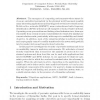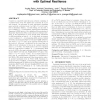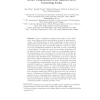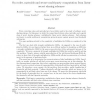28 search results - page 5 / 6 » An Efficient Protocol for Secure Two-Party Computation in th... |
ACISP
2006
Springer
13 years 11 months ago
2006
Springer
Abstract. The emergence of computing environments where smart devices are embedded pervasively in the physical world has made possible many interesting applications and has trigger...
PODC
2009
ACM
14 years 5 months ago
2009
ACM
Consider a completely asynchronous network consisting of n parties where every two parties are connected by a private channel. An adversary At with unbounded computing power activ...
EUROCRYPT
2007
Springer
13 years 11 months ago
2007
Springer
Abstract. Secure computation consists of protocols for secure arithmetic: secret values are added and multiplied securely by networked processors. The striking feature of secure co...
CCS
2008
ACM
13 years 7 months ago
2008
ACM
When users run a group key exchange (GKE) protocol, they usually extract the key from some auxiliary (ephemeral) secret information generated during the execution. Strong corrupti...
CRYPTO
2005
Springer
13 years 11 months ago
2005
Springer
Error correcting codes and matroids have been widely used in the study of ordinary secret sharing schemes. In this paper, we study the connections between codes, matroids, and a s...




